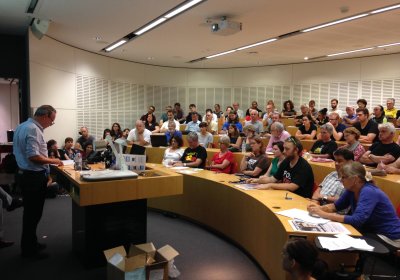Greek Prime Minister Alexis Tsipras said on April 2 that his government would strengthen the country's public health system by the hiring of 4500 extra staff and abolishing a compulsory €5 fee for treatment at public hospitals, TeleSUR English said that day.
The measure forms part of a broad package of reforms aimed at overhauling the country’s broken medical system by providing universal access to quality healthcare.
SYRIZA
The Greek parliament has debated a proposal to establish a committee to investigate loan agreements between previous governments and international lenders, TeleSUR English reported on March 31.
The motion, tabled by ruling anti-austerity party SYRIZA, would examine credit accords dating back to 2009 with organisations including the International Monetary Fund, the European Union and the European Central Bank.
There is a tense stand-off right now between Greece's government and the so-called troika — the European Commission, the European Central Bank (ECB), and the International Monetary Fund (IMF). ECB President Mario Draghi recently went so far as to deny that his institution was trying to blackmail Greece's left-wing anti-austerity government.
But blackmail is actually an understatement. It has become increasingly clear that the troika is trying to harm the Greek economy in order to raise pressure on the new Greek government to agree to its demands.
Greece demands Germany pay war reparations
Greek Foreign Minister Nikos Kotzias has proposed creating a joint commission of Greek and German experts to address the issue of World War II reparations, TeleSUR English said on March 23.
“Athens wants to come to an agreement regarding the issue of reparations, we need to find a common denominator,” Kotzias said. The foreign minister added that he prefers a political solution to the issue, rather than a legal one.
"The Greek Elections: What Next? SYRIZA and the fight against austerity," was the theme of a forum, presented by the Department of Political Economy, Sydney University, and the Australia-Greece Solidarity Campaign, on March 10 at the New Law School. Up to 150 people packed into a lecture theatre to hear a panel of speakers, followed by a lively discussion period on the key issues.
Greece’s parliament passed what it called a “humanitarian crisis” bill on March 18 in order to help the poorest sectors of its population.
In a move opposed by representatives from the European Union, the government of left-wing Prime Minister Alexis Tsipras pushed for housing allowances and emergency food aid to people in need.
What does the victory of radical left party SYRIZA in Greece's January 25 elections mean for politics in Europe, at Europe-wide and national levels? Both levels are closely intertwined, and since SYRIZA’s win have been having rapid feedback effects on each another.
Across Europe, the reverberations of SYRIZA’s win are being felt with rising force, both in “peripheral” Europe, but also in the German-led European Union “core”.
Support for the Greek government headed by radical left party SYRIZA is growing, new polls show. The polls also found high support for SYRIZA's negotiations with its creditors, which secured a deal to extend its loans package by four months.
The deal came with significant concessions to the institutions that have imposed austerity on Greece, which led to strong criticisms from SYRIZA's Left Platform, which believes the party should either prepare for, or at least consider, leaving the eurozone and returning to the drachma.
He is an economist, academic, poet, blogger, video game consultant, libertarian Marxist, motorbike rider and accidental fashion icon. Now he’s the holder of possibly the most difficult job in the world: Greece’s finance minister.
Meet Yanis Varoufakis, SYRIZA Prime Minister Alexis Tsipras’s right hand man and the key negotiator between Greece and its creditors.
In downtown Athens, Varoufakis is well liked among the public. He is the definitive cosmopolitan, self-made man who sees himself as a citizen of Europe as much as Greece.
If history is any guide, it is reasonable to assume that Greece’s recently-elected left-wing SYRIZA government will be subjected to a foreign-backed destabilisation campaign and possible attempts to install a new right-wing authoritarian regime.
There is a long history in Greece of the left being suppressed by the oligarchy collaborating with outside forces.
Greece’s new SYRIZA government submitted its list of proposed economic reforms to the Eurogroup (the finance ministers of eurozone nations) on February 23 as a precondition for its international creditors to approve a four-month loan extension. The deal was signed on February 20.
With Greece’s existing loan arrangement expiring on February 28 and bankruptcy looming, a last-minute deal was finally agreed after three weeks of intense negotiations. The talks had been characterised by daily — sometimes hourly — twists and turns, claims and counterclaims, leaks and threats.
The pledge below was published on the website of the Australia-Greece Solidarity Campaign, which says: “Let Greece Breathe is a campaign for hope and justice. We aim to show that Greece and the Greek people are not alone in their hour of need.
“A victory for Greece will be a victory for people everywhere -- that is why the battle is so fierce. You can help by endorsing the statement and pledge below.”
***
- Previous page
- Page 3
- Next page








